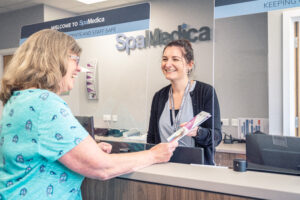Coventry
1410 Spring Place, Herald Avenue, Coventry Business Park, Coventry, CV5 6UB
1410 Spring Place, Herald Avenue, Coventry Business Park, Coventry, CV5 6UB
Opening hours:
Mon to Fri 8:00 - 18:00
Tel: 0330 058 4280
SpaMedica Coventry is a modern, state-of-the-art facility, which opened in July 2020. Our hospital facilities here are first-class and equipped with the latest technology.
We look forward to welcoming you to SpaMedica Coventry. The team here will always welcome you with a smile and answer any questions you have about your appointment or surgery.
Getting treatment
How to find us
Our hospital is located in Coventry Business Park, accessible from Herald Avenue. The patient car park is located at the top of the business park – follow the road around to the right, continue straight past the office buildings on your right, following the entrance signs and turn right into the SpaMedica car park. You can reach Herald Avenue from the East (city centre) or West (off the A45). Coming from the East, go straight over the roundabout from Tile Hill Lane onto Herald Avenue and take the first right into Coventry Business Park.
From the West, exit the A45 onto Vanguard Avenue, you’ll see the Citroën garage on your left, turn left on to Herald Avenue and go straight over the roundabout, then take the first left into Coventry Business Park.
There are two bus stops close to SpaMedica Coventry. They are located on Tile Hill Lane and Herald Avenue. These bus stops are a two-minute walk away from the hospital. The bus numbers which stop along Herald Avenue are 4,10 and 11. The bus numbers which stop along Tile Hill Lane are 6 and 6A.
The nearest train station is Canley Station, which is located on Canley Road. The distance from the station to the hospital is approximately half a mile. For train times/connections please call 03457 484950 or click here to visit the National Rail Journey Planner.
If you live in England, all you need to do is let your optician or GP know which healthcare provider and hospital location you would like to have your cataract treatment at, and they’ll send a referral to your chosen provider. You should hear back from your provider within two to three weeks following your referral. If you haven’t heard anything after this point, we recommend contacting the person who referred you—this will be your optician or GP—to check on the status of your referral.
Giving you local access to the highest standards of care. With over 61 hospitals nationwide, all rated 'Good' or 'Outstanding' by the Care Quality Commission, SpaMedica is the largest independent provider of NHS cataract treatment in the UK. Our experts will ensure you feel comfortable and confident from diagnosis to recovery. Having partnered with the NHS for over 15 years, we proudly support thousands of patients every month with ophthalmic conditions.
The only suitable treatment for cataracts is surgery. It is one of the safest surgeries you can have and is also the most common operation performed in the UK today, taking up to only 20 minutes for routine cases. The cloudy lens is removed and replaced with an artificial lens (implant). This is normally done under a local anaesthetic using eye drops to numb the eye.
Leave a review
Got a story to share? Let us know what you think by leaving us a review.
Frequently asked questions
Cataracts are a clouding of the lens in the eye which can cause blurry vision and difficulty seeing in low light conditions.
Age Related Macular Degeneration is not preventable but certain lifestyle changes such as eating a healthy diet rich in fruits and vegetables not smoking and protecting your eyes from UV rays can help lower the risk of developing the condition.
A Yag Laser Capsulotomy is a procedure used to treat a cloudy capsule behind the lens that may develop after cataract surgery. The laser creates a hole in the capsule to improve vision.
Common symptoms of cataracts include blurry or cloudy vision difficulty seeing at night sensitivity to glare and faded colors.
Age Related Macular Degeneration is a progressive eye condition that affects the macula causing loss of central vision.



